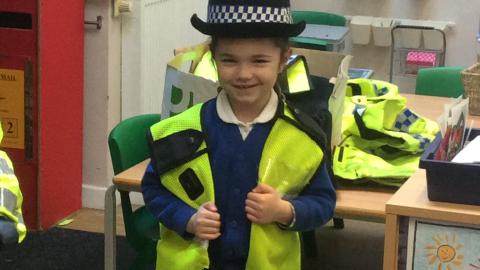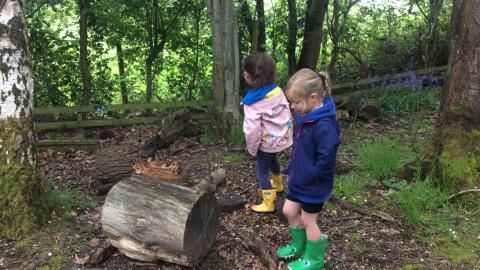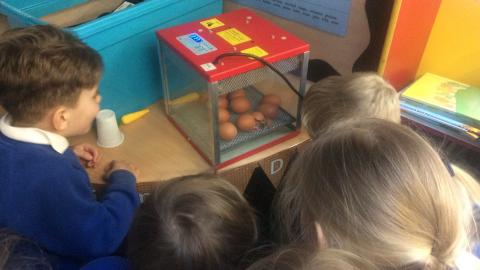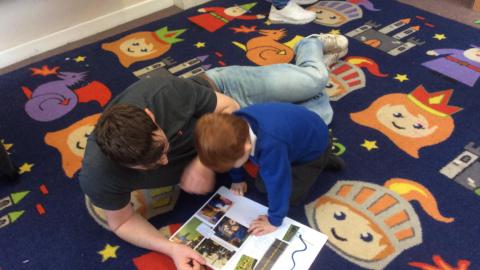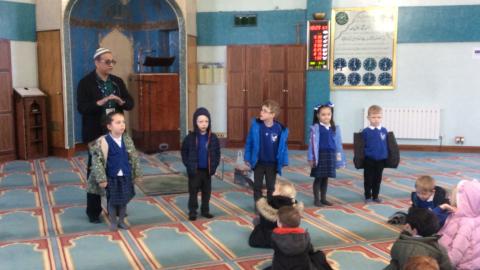EYFS Leader - Miss Akrigg
In Robins class the Reception children are taught within the Early Years Foundation Stage (EYFS) framework. This is a statutory framework in the form of a government document that all schools and early years providers in England must follow. It sets standards for the learning, development and care of your child from birth to 5 years old. The framework ensures that children learn and develop well and are kept healthy and safe.
Characteristics of Effective Teaching and Learning
The EYFS framework identifies the importance of play in your child’s development. Through child-led play and activities guided by an adult your child will develop confidence, resilience and strong relationships with others. Through play, Miss Akrigg and the other adults in Early Years will help your child to extend their vocabulary and develop their communication and language skills. The EYFS framework identifies three characteristics of effective teaching and learning: Playing and Exploring, Active Learning and Creating and Thinking Critically.
The EYFS framework outlines seven areas of learning and development.
Prime Areas of Learning.
There are three prime areas of learning, which are particularly important for your child’s development and future learning: Communication and Language; Personal, Social and Emotional Development and Physical Development. We support your child’s development in these areas through play and a wide variety of adult guided learning.
Specific Areas of Learning.
There are four specific areas of learning, through which the prime areas are strengthened and applied: Mathematics, Literacy, Understanding the World and Expressive Arts and Design.
Changes to the Early Years Foundation Stage Curriculum in 2021
The Early Years Foundation Stage (EYFS) has been reformed and there is a new EYFS framework that all schools and settings are required to follow from September 2021. We welcomed the changes which were made to better support all pupils’ learning and development. It was also the aim that the new framework will better prepare pupils for the transition into Key Stage 1, our long term planning documents show a clear breakdown of how we prepare your child for Key Stage 1 accross the curriculum. There were some elements of the EYFS that did not significantly change and some that did.
The the key points from the reforms embraced by staff at Kildwick CE School are:
- Early Years staff are now spending less time on large amounts of written observations and assessments for evidence collection. This means they can spend more time supporting and engaging with the children and their learning and development needs.
- Pupils are no longer assessed against statements from an age band category. Instead, staff use their experience and knowledge to monitor if a child’s learning and development is on track for their age.
- The early learning goals at the end of reception were changed to become more clear and easier to understand. Staff use their judgements to assess if the children have met these goals at the end of the EYFS and inform parents/carers.
- There is a greater emphasis on improving pupil’s language and vocabulary through increasing opportunities for conversations, reading of a wide range of books and holding discussions around activities in other areas of learning.
- EYFS Literacy and mathematics knowledge has been adapted to better match up with the National Curriculum that starts in Year 1.
- There is no longer an exceeding judgement at the end of Reception. Pupils are challenged to have a greater depth and understanding of ideas.
- Safeguarding and welfare of pupils is still our priority, with a greater emphasis on the importance of good oral health and how to keep teeth clean and healthy.
The EYFS Curriculum at Kildwick CE School has been designed to meet the learning and development needs of our Reception children. It also provides a firm foundation of knowledge which will be built on in Key Stage 1. The links to the KS1 curriculum are very tangible as Reception children are taught in a mixed Reception / Year One class. This means that the topics covered are linked to the Year One topics. Whilst children are not expected to join in with formal learning in Year One lessons they are exposed to the key knowledge and information (with a keen focus on the vocabulary). Learning for Reception children is then enhanced through provision. When children revisit these learning areas in Year One and/or Two they are able to build on their existing knowledge. This further reinforces our approach that ‘practice makes permanent’. We see repetition as a good thing!
Our main aim in Reception at Kildwick CE School is that the children enjoy coming to school. Learning to Live, Living to Love and Loving to Learn starts in Reception!

